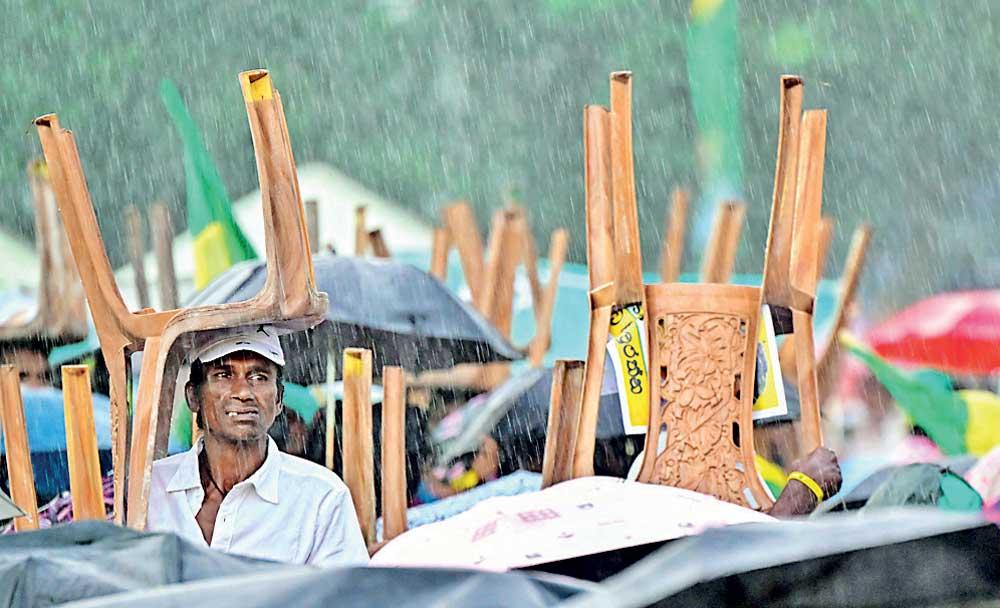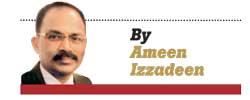Reply To:
Name - Reply Comment

Samagi Jana Balawegaya supporters attend a political rally in Colombo amidst pouring rain.
Pic by Ishara S. Kodikara/AFP
 Politics and corruption are inseparable twins in most developing countries, including Sri Lanka. Yet, no election campaign is complete without corruption becoming the topmost vote-catching strategy in these countries.
Politics and corruption are inseparable twins in most developing countries, including Sri Lanka. Yet, no election campaign is complete without corruption becoming the topmost vote-catching strategy in these countries.
Except during the 2019 election campaign, where national security was the decisive factor, Sri Lanka’s election platforms have seen opposition politicians branding the ruling party politicians as corrupt. But once the opposition becomes the ruling party, its members indulge in corruption and get embroiled in scandals. The cycle continues.
What guarantee do the voters have that the candidates who shout themselves hoarse about corruption will be squeaky clean once they are ensconced in office? Don’t they say politics is a dirty bog and whoever falls into it cannot claim to be clean?
The top three candidates contesting the September 21 presidential election vow to battle corruption. President Ranil Wickremesinghe says he has introduced laws and will strengthen the mechanisms to eliminate corruption, while Samagi Jana Balawegaya candidate Sajith Premadasa and National People’s Power candidate Anura Kumara Dissanayake vow they will catch the corrupt, put them behind bars, and bring back to the country the billions the corrupt are said to have stacked in offshore rogue banks or rogues’ banks.
Since politics is a game of deception, we never know how clean or corrupt the next government will be or how honest they are with their promises to combat corruption. Once the elections are over, it is a different ballgame.
Governments play the game by bending transparency and good governance rules. No political party is committed to 100 percent transparency in government. Moreover, there’s a lot we don’t know about these political parties and their funding. The campaign finance law limits a candidate’s campaign expenditure to Rs. 1.8 billion. The law demands every candidate submit the accounts to the Election Commission. But politicians are not short of crooks to cook the books.
If the candidates are indeed committed to transparency, should they not reveal to the people attending their campaign rallies how much money they got from whom?
Donation is a form of ‘legal’ corruption. Political parties may be legally allowed to receive donations, but in politics, donations come with a quid pro quo—I scratch your back and you scratch mine. If donations are made with receiving a specific favour or a government decision in return, it is a form of bribe. If a political party shows reluctance to reveal the sources of its donations, then it gives rise to suspicions that black money or corrupt businesses were involved.
This country is going to poll to elect a new president amidst an economic crisis simmering beneath the normalcy the incumbent president is credited with achieving. None of the candidates can say with certainty when the crisis will end. The three possibilities are: it may become worse, it may turn better, or the status quo will continue, depending on the economic strategies the next government will pursue.
Battling corruption should be a top priority of whichever candidate forms the next government. Unchecked corruption has gobbled billions of rupees from the state coffers. Although there is no attempt at an audit to assess the cost to the Sri Lankan economy due to corruption, it is an open secret that most politicians and public servants are corrupt.
In Sri Lanka, corruption was made easy by weak anti-corruption mechanisms. Enactment of anti-corruption laws was often a painful process. In July last year, however, Parliament passed without a vote a comprehensive anti-corruption bill that, inter alia, strengthened the Commission to Investigate Allegations of Bribery or Corruption. The new law, operational from September last year, was connected to the International Monetary Fund’s programme. The $3 billion bailout package was conditioned upon the government introducing anti-corruption legislation to strengthen governance and bring it in line with the United Nations Convention Against Corruption. In its Governance Diagnostic Assessment on Sri Lanka, the IMF insisted on the need for stronger anti-corruption frameworks, including better enforcement of existing laws and the introduction of legislation to combat corruption more effectively.
The new Act broadens the definition of corruption to include decisions made with a dishonest motive, causing unfair advantage or loss deliberately. It strengthens the commission’s independence and carries a compulsory assets declaration provision targeting public servants, who include elected representatives.
On the IMF’s direction, the government also passed the Proceeds of Crimes Act and drafted a stolen asset recovery bill. The fact that these measures are being implemented at the IMF’s behest is a serious indictment of the anti-corruption commitment of successive Sri Lankan governments.
Although left-oriented political parties decry the IMF as a tool of Western imperialism and its intervention as neo-colonialism, the reforms the Washington-based institution pushes in mismanaged economies can bring about a positive economic turnaround, provided they are implemented by astute political leadership with economic acumen.
The IMF regularly publishes cost-of-corruption reports. Noting that revenue collection is higher in less corrupt countries, its 2019 report cited Georgia as a positive example.
In Georgia, in 2003, a new government launched an aggressive campaign to reduce corruption from very high levels. The result: tax revenue jumped from 12 percent to 25 percent of GDP in five years, even as tax rates were lowered.
“Georgia’s success reflected a new culture of tax compliance: the share of people who felt it was never justifiable to cheat jumped from about 50 percent to almost 80 percent. Improvements in services, including lower crime rates and fewer power outages, and renewed trust in government made people more willing to pay taxes. Higher revenue also made it possible to clear wage and pension arrears, further bolstering confidence in the government.”
Sri Lanka has been sliding down on Transparency International’s corruption index, and one hopes the measures the present government has taken and the future government is expected to take will give the country a top ranking close to Denmark. A strong legal framework, access to information, media freedom, an independent judiciary, and a high level of public trust in state institutions have made Denmark the world’s most corruption-free country.
To conclude the article, citing a story from history is appropriate.
From the corrupt Umayyad dynasty, there arose a righteous caliph who ruled the Islamic world from 717 AD to 744. He lived as an ascetic. His name was Umar Ibn Abdul Aziz. The Caliph had two candles: a state-owned candle and his own candle. He used the state-owned candle when writing official letters and his candle when writing personal letters. Once a friend visited him for a personal matter while he was on official work. He immediately blew out the state-owned candle and spoke to him in the dark.